My personal quest to find the safest parasite protection for dogs known to carry the MDR1 (Multi Drug Resistance) gene led me on a merry chase. MDR1 is a drug sensitivity that affects the majority – approximately 70%-75% of Rough and Smooth Collies in the USA and potentially worldwide. (There are 13 other at-risk breeds including Border Collies, Australian Shepherds, German Shepherds, Shetland Sheepdogs, and Old English Sheepdogs, plus herding breed mixes.)
The lack of accessible information on the topic of safe parasite protection for dogs with the MDR1 gene (Multidrug Resistance gene) left me so frustrated that I decided to write my own article. So here’s the culmination of my research: information gathered from laboratory case studies, veterinarians, and Collie owners, breeders, and exhibitors. It was somehow both boring and interesting work, but it yielded helpful information.
I have an Aussie mix, plus three Rough Collies who have 1 copy of the MDR1 gene (carriers/mildly affected), so I have a vested interest in everything I’ve researched. I’ll list products I’ve looked into – several of which I’ve personally tried – along with whether they’re generally considered safe to use or should be used with caution. Technically, they’re all supposed to be safe, but some products are undoubtedly better and more consumer-trusted than others. (Follow this link for official problem drugs.)
If you’re hoping for a quick, easy skim and just want to know which pest protections are rated safest and best, I’ll give those first under each category. In fact, in full expectation most people will skim, I repeat myself a lot. Sincere apologies to those who read this article start to finish… But hey, repetition is the key to retention, right?
This is not an exhaustive listing of every product out there, but it will provide tools to identify which meds are related to each other or essentially the same as major brands. It’s all based off active ingredients. For instance, Heartgard’s main ingredient is Ivermectin, so any product containing Ivermectin falls under the same category. If you want to know about a specific product, read the active ingredients on the front of the box and compare to one of the products listed in this article. Or check the 100+ comments below this post!
For those who want more in-depth information, I’ve created embedded links throughout for further reading. (Some of the links lead to peer-reviewed scientific articles, so have fun with those if you want the bare, dusty facts.)
Disclaimer: even parasite protection products officially labeled safe – for an MDR1 dog or any dog – should really be designated “safe-ish.” But parasite preventives are chemical compounds – some of which are used in pesticides – and thus have more potential to cause a reaction than just, well, water. Any dog can be sensitive to a certain substance and should always be monitored for reactions after a new product has been administered. However, Collies and associated breeds, with or without an MDR1 status (officially the AbCb1 gene), simply have a reputation for being generally sensitive and prone to side effects from parasite preventives.
I’ll also discuss organic topicals I’ve found somewhat effective as repellents. Unfortunately I have not learned of any natural pest control products as effective as chemical-based ones. This article from Your Dog Advisor gives natural prevention options and explains how to mix your own parasite preventives using essential oils. However, dogs can also be sensitive to essential oils – like my friend who is allergic to lavender – so “natural” doesn’t automatically mean “best” for your dog either. You should still keep an eye on your pet when introducing new organic products.
Heartworm Preventive / Treatment
Bear with me for a little pharmaceutical science, which I promise is important and will make sense in the end! It’s simpler to identify medicines by their components. Some are nearly the same thing marketed under different brand names.
All the available heartworm medications on the market are a variation of what is known clinically as a ML (macrocyclic lactone) compound. These four ML compounds (ivermectin, moxidectin, selamectin, and milbemycin oxide) have been officially approved by the FDA (Federal Drug Administration) and tested safe for MDR1 dogs when administered at the recommended preventative dosage.
However, not all ML’s are created equal, and some are safer than others. If an MDR1-affected dog were to be treated for mange, that would involve higher dosages and could cause adverse reactions. Another danger often lies in a treated dog being exposed to additional environmental pesticides, which can lead to an accidental overdose.
Regardless of the heartworm product you choose, as the Institute of Pharmacology and Toxicology says, “treatment of MDR1 mutant dogs with macrocyclic lactones in general requires particular caution.” It really boils down to weighing the benefits of medications against the risks from internal parasites.
TOP PICK
Interceptor Flavor Tabs (milbemycin oxime)
Interceptor, which comes in a monthly chewable form, has been specifically tested and approved for dogs with MDR1. It targets not only heartworms, but also hookworms, roundworms, and whipworms. Additionally, it can also be given to cats and even pregnant or nursing animals.
Interceptor is the go-to heartworm preventive for many Collie parents. I polled an international forum for Collie lovers – the breed with the highest occurrence of MDR1-affected dogs – about which heartworm medication they preferred. Out of 67 respondents, 48 said they used Interceptor, with no side effects reported.
Some veterinary clinics stock it for their clients, and it is also available at online stores like 1-800-PET-MEDS or Chewy. I save money buying the generic Milbeguard. (If you order online, keep in mind that the company will first need to contact your veterinarian for a prescription to be issued.)
According to a thorough study conducted on MDR1-affected dogs, Interceptor ranked high in ML safety due to its use of the compound called milbemycin oxime. Documented negative reactions were only provoked at higher-than-normal dosages and were comparatively mild, consisting of salivation, ataxia (dilated pupils), and depression.
The amped-up version, Interceptor Plus, also contains praziquantel, which is used to treat tapeworms. However, the safety of Interceptor Plus has not been evaluated for pregnant or lactating dogs, and it is not recommended for cats. Negative reactions such as vomiting, diarrhea, and tremors were only observed at supratherapeutic (higher than recommended) doses. But unless your dogs have had a problem with tapeworms (whose segments are visible to the naked eye in dog’s poo), then the regular Interceptor should be fine.
USE CAUTION
Heartgard Plus (ivermectin/pyrantel)
Probably the most well-known heartworm medication is Heartgard, which contains Ivermectin. Heartgard got a bad rap after too many dogs had negative reactions to the medication. With complaints rolling in, the company made adjustments to the Ivermectin content in their product, and Heartgard is now advertised as “safe at the recommended dosage.” But according to Dr. Judy Morgan, “Neurologic side effects are a possibility with Heartgard.”
The Whole Dog Journal notes that “Ivermectin has the most potential for toxicity.” As mentioned above, polling a Collie lovers’ forum showed that only 9 of 67 people used Heartgard, and another 5 people said their dogs had a bad reaction to it. One woman even said her Sheltie died after being given Heartgard.
Anecdotally, other veteran Collie breeders and owners have horror stories of even MDR1-clear Collies displaying adverse reactions to meds containing Ivermectin. They won’t recommend “harsh” medications such as Heartgard for any Rough Collie, Smooth Collie, or other breed prone to MDR1. Even if a genetic test reveals a dog to be normal/normal (clear) of the MDR1 gene, it seems these breeds are just more likely to show medication side effects.
There are other risks involving Ivermectin. A dog on Heartgard may – because dogs can be gross – eat the feces of an animal who was given an Ivermectin-based medication. For dogs who have a case of mange or ear mites, the treatment can involve topical applications of compounds containing (you guessed it) Ivermectin. Any of these scenarios can cause unintended overdoses. Bottom line: it’s best to avoid giving your Collie Heartgard or a similar medication. There are definitely better options.
Several Heartgard knockoffs are available such as Tri-Heart Plus, Iverhart Plus, and Nuheart. Because of their similarity to Heartgard, I’ve placed them in the same “caution” category. There is also an injectable product called Pro-Heart, a shot that lasts for 6 months. It’s a very appealing option, but still not one I will recommend due to its high Ivermectin content.
Combination Medication (Internal/External Parasites)
The parasite protections that target multiple parasites with just one topical application or administration of a pill are extremely appealing due to their convenience. The drawback of using them is that they generally don’t take care of as large a range of parasites as using two separate medications does.
In particular, though some of these combination medications do cover ticks, none specifically target the blacklegged ticks which carry Lyme Disease. If you use a combo internal/external parasite preventive, consider asking your vet about a Lyme Disease vaccination. This is less of a concern if you don’t walk your dogs through woodsy areas in a region where these ticks are prevalent.
TOP PICK
Revolution (selamectin)
Revolution, along with a product called Stronghold, tested safest in clinical trials of heartworm medications. Selamectin is their shared main ingredient. Revolution and Stronghold even tested safe over the recommended monthly dosage for dogs with the MDR1 gene, and they hold the distinction of being the only heartworm meds that did not produce any negative drug reactions.
Revolution is also an attractive option due to its ease of application (topical squeeze-on tube) and versatility against heartworm, fleas, dog ticks, sarcoptic mange, and even ear mites.
*Important note: since Revolution does not protect against blacklegged ticks, ask your veterinarian about getting a Lyme Disease vaccine.
GOOD PRODUCT
Sentinel (milbemycin oxime/lufenuron)
Sentinel comes in a chewable pill form and protects against multiple internal parasites (heartworms, whipworms, hookworms, and roundworms) as well as the development of flea eggs. One downside of this medicine is that it will not eliminate adult fleas – or any ticks. Sentinel has been referred to as “flea birth control.” You may want to use it in combination with products like Capstar or an insect repellent spray. (More on those later.)
From a safety standpoint, this is a pretty good product. But be aware of its limited coverage of external parasites and non-endorsement for pregnant or nursing female dogs.
USE CAUTION
Advantage Multi (moxidectin/imidacloprid)
A strong medication, Advantage Multi is a spot-on treatment targeting heartworms, whipworms, roundworms, hookworms, and adult fleas. Additionally, it can be used to treat and control sarcoptic mange. Unfortunately, it does not cover any ticks.
Moxidectin, the heartworm-fighting portion of Advantage, is considered safe if the proper dosage is given monthly, but it did not test as well as either selamectin or milbemycin oxime in clinical trials, though it ranks above Ivermectin.
Studies have shown that the way an ML (macrocyclic lactone) is administered to an MDR1-positve dog makes a drastic difference in how it affects them. For instance, some ML’s are best tolerated when orally ingested, which meant that a pill form of that particular compound was developed; but moxidectin was just the opposite.
As noted in an article by Dog Aware: “Advantage Multi, which combines imidacloprid for flea control with moxidectin for heartworm prevention, was found to cause no side effects when applied topically to affected dogs even at 5 times the recommended dose, but ingesting less than half the recommended topical dose caused extreme toxicity leading to coma in four of five dogs.”
With Advantage Multi, great care should be taken to only apply the liquid between a dog’s neck and shoulder blades, where it cannot be reached by licking. Children should be kept away from the dog for 2 hours until the liquid has had time to dry, and hands should be washed after application. You might want to pick a different parasite preventive if you have more than one dog. Herding breeds in particular like to “herd” each other by gnawing on the backs of their necks!
USE CAUTION
Trifexis (milbemycin oxime/spinosad)
Trifexis is perhaps the most well-known (and frequently peddled at veterinary clinics) of this combo category. It is easily administered since it is a flavored chewable, and it takes care of heartworms and fleas. On the downside, it does not cover any ticks. If you’re someone who lives in a tick-prone area or likes to take your dogs on woodland rambles, this is a letdown.
According to the product description, side effects as a result of Trifexis are rare, but can be as severe as seizures or even a coma. While this study conducted on twenty MDR1-affected Collies did not reveal any adverse reactions when the dogs were given low doses of Milbemycin Oxime combined with Spinosad, the Washington State University of Veterinary Medicine does advise that “some of the combination flea+heartworm preventive products (those containing spinosad) should be used cautiously in dogs that are MDR1 mutant/normal because of a risk of serious drug-drug interactions.”
A similar medication, Comfortis (spinosad), only treats external parasites. But I’ve given it a “caution” designation as it is not safe for dogs at risk for seizures.
Flea & Tick Prevention: Oral
GOOD PRODUCT
Capstar (nitenpyram)
Capstar specifically targets adult fleas, so it is best paired with a product like Sentinel. It comes in pill form, starts working within 30 minutes, and will kill all the adult fleas on a dog within 4 hours. Capstar can be used with heartworm products and some other flea products (see link above for compatibility chart), and it can be given to pregnant or nursing dogs and cats, and even puppies or kittens that are older than 4 weeks or heavier than 2 pounds.
On the downside, its efficacy only lasts for about a day, it doesn’t target ticks, and it is definitely not cost-effective. Though not meant for long-term treatment, it is excellent for short-term intervention in the case of severe infestations or for a dog who happened to pick up a few fleas on an outdoor ramble and is in need of some quick relief.
SOME CAUTION
Credelio (lotilaner)
Credelio is a relatively newer medication released in January 2018 by Elanco, the same company that makes Interceptor. It is safe for use with anthelmintics like heartworm meds and has no known negative drug-drug interactions. I love that it quickly kills adult fleas and four kinds of ticks: American dog tick, brown dog tick, lone star tick, and black-legged ticks – which carry Lyme Disease. Before being approved by the FDA and released to the public, clinical trials were performed on Beagles (a breed prone to seizures) and Collies (prone to MDR1).
Credelio stands out from the other three members of its class by using the active ingredient lotilaner. It was uniquely formulated with more reaction-prone breeds in mind. Still, as an isoxazoline it is technically in the same family as Nexgard, Bravecto, and Simparica.
Credelio had very few (6 reported seizures in as many months) negative reports submitted to the FDA at the time; but it was still required to add a precaution to its label because a) its main ingredient is in the “-laner” family, and b) it is a newer product with a lower usage rate. As the agency explained: “Although FDA scientists carefully evaluate an animal drug prior to approval, there is the potential for new information to emerge after marketing, when the product is used in a much larger population.” (New drugs continue to be highly monitored for the first three years following their release.)
My veterinarian specifically recommended Credelio as a safer option for my MDR1-heterozygous (mutant/normal) Collies with flea allergies. (The mutant/normal designation means a dog has one copy of a gene and is a carrier, though not affected to the degree that a homozygous, or mutant/mutant, dog would be.)
Since the Credelio medication can be passed through a mother’s milk, it is not recommended for pregnant or nursing female dogs. However, it is safe for puppies 8 weeks of age and older. Like any oral medication, It should be given with food to avoid a possible upset stomach.
MORE CAUTION
Nexgard, Bravecto, Simparica (isoxazolines)
In September of 2018, the FDA issued a warning to all users of Bravecto (fluralaner), Nexgard (afoxalaner), and Simparica (sarolaner). Though all of these medicines had previously been approved by FDA scientists, now “data received by the agency… indicates that some animals receiving Bravecto, Nexgard, or Simparica have experienced adverse events such as muscle tremors, ataxia, and seizures.”
Regarding seizures specifically: at that time Nexgard averaged 263 reported per year, Simparica averaged 186 reported per year, and Bravecto averaged 180 reported per year.
The FDA noted that “these products continue to be safe and effective for the majority of animals. The agency is asking the manufacturers to make the changes to the product labeling in order to provide veterinarians and pet owners with the information they need to make treatment decisions for each pet on an individual basis.”
While the FDA did not pull these drugs from the market, it asked the product manufacturers to add precautions to their labels while it continues to monitor information submitted by veterinarians, the companies themselves, and individual product users. The FDA alert regarding the medications in the isoxazoline class of drugs was still in effect as of 2021, and likely will remain in effect.
In light of this, I’m categorizing all three of these oral flea/tick protection chews as “use with caution.” A link between the occurrences and seizure-prone or MDR1 dogs has not been identified.
MOST CAUTION
Nexgard (afoxalaner)
Though I already mentioned Nexgard as being included in the FDA statement, I’m dealing with it separately because it is such a well-known product. It is also frequently used in combination with Heartgard and other anthelmentics, which can be risky, due to potential negative drug-drug interactions. Most pet parents give heartworm medications in conjunction with flea & tick medications, so I’d have given Nexgard a “caution” label even before the FDA warning came out.
While Nexgard had the highest number of seizures reported annually, it may be related to being used with other drugs. I also wonder if it has a higher usage rate, but I don’t have the number of annual sales in relation to the other two popular products. Personally, I won’t recommend it.
Dr. Judy Morgan described the case of a Beagle brought to her that was suffering from seizures, which were likely the result of or worsened by being wrongly prescribed Nexgard in combination with another medication. Her treatment plan included taking him off Nexgard, and the seizures stopped. Dr. Morgan concluded her story with: “Be your pet’s advocate. If the veterinary staff can’t see they are prescribing the wrong combination of medications, maybe you can point it out to them.”
Flea & Tick Prevention: Topical
These can come in a few different forms: monthly spot-on, a disposable collar, or a spray. The Whole Dog Journal points out that “oral flea-control medications have been proven to be more effective than topical pesticides in both killing fleas and helping to control a household infestation more quickly.” While this is true, the benefit of topical treatments is in their general safety.
However, as with any chemical compounds, caution is advised even with products deemed to be safe. According to Dog Aware, most “flea and tick control medications have not been found to cause adverse effects when used as directed, but toxicity can occur if topical products are ingested.” This is why reading labels is so important. If a spot-on treatment is applied between the neck and shoulders as directed, no harm should befall a dog; but if it’s applied past the shoulders where a dog can reach with its tongue, that could definitely cause problems.
TOP PICK
Advantage II (imidacloprid/pyriproxyfen)
Advantage takes care of fleas at all life stages and is even supposed to kill them on contact, and it also covers lice. It is approved for use on puppies at least 3 pounds in weight and 7 weeks of age, cats, and even ferrets. As with any topical product, monitor your pet for signs of skin irritation, and give them a bath within 24 hours to wash it off if signs of irritation are seen. After 24 hours, it is considered waterproof and a bath, while alleviating some effects, will not offer as much relief.
The drawback of Advantage is that it does not offer any protection against ticks. If you’re living in an urban setting, this product could still be a good option for you, as you’re not likely to encounter many ticks in a concrete jungle. For those who like Advantage but are concerned about ticks on their dogs, the Preventic Tick Collar can be worn for additional protection. (Just bear in mind that Preventic contains amitraz, which is toxic to cats.)
GOOD PRODUCT
Frontline Plus (fipronil/s-methoprene)
Frontline Plus targets four kinds of ticks, fleas (including eggs and larvae), lice, and mites that cause sarcoptic mange. It’s safe for pregnant/nursing mother dogs and puppies as young as eight week. After talking to a variety of Collie people, Frontline seems to be the most trusted of the topical flea/tick products available. Anecdotally anyway, it is reported to have gentler ingredients and the least tendency to cause skin irritations.
An added benefit is it has been around long enough that cheaper generic products are available, some of which I’ve tried and found to be as effective as Frontline. (One such knockoff, Pet Armor Plus, is even available at Walmart.)
Unfortunately, the fleas are fighting back. Some parts of the U.S. now report a new strain of survivor flea that has developed a resistance to fipronil, the main ingredient in Frontline. If you live in an area where the fleas just refuse to die, you may want to consider an alternative, stronger product.
GOOD PRODUCT
Natural Chemistry (cinnamon, clove, cedarwood oils)
For anyone who prefers to use organic instead of chemical products or would like a repellent in addition to what you are already using, this is the flea and tick spray for you! It will make your dog smell absolutely yummy while protecting them from fleas, ticks, black flies, and mosquitoes. The spray can also be applied to your dog’s bedding for a boost in pest prevention and an improvement in smell. Natural Chemistry claims to kill on contact and to be safe for puppies.
The key to getting this spray to work well is to apply it well (rub against the lay of the coat while spraying the roots of the hair to get down to the skin); thoroughly (to the underbelly, legs, and paws); and often (at least once a week, more if your dog gets wet). While I didn’t find it quite as effective as the label says, that might have something to do with living in pest-ridden Florida and having heavy-coated dogs. Honestly, I’d use it as a deodorizer even if it was completely ineffective against parasites.
GOOD PRODUCT
Diatomaceous Earth (fossil shell flour)
This organic powder is great for a variety of uses. Some swear by food grade DE (diatomaceous earth) as a natural dewormer of roundworms, hookworms, whipworms, and even tapeworms. However, it will not affect heartworms at all, since they do not infest the gastrointestinal tract.
It can be used to destroy bedbugs, cockroaches, ants, and even fleas. I like to sprinkle some around the perimeter of my yard and lay an inner circle around the edges of my house – which probably looks like I’m trying to keep out evil fairies and other fantasy creatures. You can even scatter some on your dog’s bed. DE works best when dry, and its effectiveness will be reduced after it gets wet.
Rich Soil gives this excellent explanation of what DE is and how it works:
“…the fossilized remains of marine phytoplankton. When sprinkled on a bug that has an exoskeleton (such as bed bugs, ants or fleas) it compromises their waxy coating so that their innards turn into teeny tiny bug jerky. But it doesn’t hurt mammals. We can eat it. We do eat it! It’s in lots of grain-based foods because lots of grains are stored with diatomaceous earth to keep the bugs from eating the grain.”
EXTREME CAUTION
Seresto (imidacloprid/flumethrin)
The best thing about Seresto is how long it can do its job – up to 8 months! It is formulated to repel and kill fleas and 4 kinds of ticks on contact, provide protection from lice, and treat/control sarcoptic mange. The collar releases no odor or residue, comes with a quick release catch to prevent accidental choking, and even has safety reflectors. Though water resistant, frequent bathing or swimming (once a month or more) will reduce the collar’s effective time to 5 months or less.
However, I won’t recommend Seresto collars. It is now known that they have caused seizures and death in dogs and even some reactions in humans who sleep with their dogs in their beds. (This is for all dogs, not just for dog breeds at-risk for MDR1.) From the time that the collar went on the market in 2012 until 2020, the EPA (Environmental Protection Agency) received 1,698 reports of deceased pets. That averages out to about 212 deaths per year. Not a high number? Sure. But dead is dead.
Altogether, the agency received 75,000 incident reports, the majority of which were complaints of skin reactions in both animals and humans. I’ve talked to Collie and Aussie owners who absolutely swear by their Seresto collars and others who are livid because they made their dogs’ neck bald!
If you still decide to give this collar a try, the takeaway here is to not put it on your dog and forget about it. As with everything else, monitor your dog for symptoms. The majority of canines will be fine, but there are enough who will react. Unfortunately, it seems most people who lost their dogs to Seresto collars simply did not make the connection until it was too late.
If Seresto seems to be negatively affecting your dog, remove it and bathe the dog (paying particular attention to the neck area) with a gentle shampoo and multiple rinses.
USE CAUTION
K9 Advantix II (imidacloprid, permethrin, pyriproxifen)
This product has the distinction of repelling and killing fleas (at all life stages), ticks, lice, mosquitoes, and even repelling biting flies. Unlike many other external parasite treatments that only kill little bloodsuckers after they’ve bitten the dog, K9 Advantix claims to kill them on contact. A product this strong may not be best for a dog that has sensitive skin issues, as irritation can develop at the site of application. To help with this, the product can be applied in more than one line between the neck and shoulder blades.
Since Collies and cats go together so well, I have to include this caution for cats: “Some ingredients used to kill ticks, such as permethrin (used in K9 Advantix and other products) and amitraz (used in Certifect and the Preventic collar), are toxic to cats, which can be a problem in a household that includes both, especially if they are friendly with each other.” If you have cats that share sleeping space with and/or like to groom your dogs, Advantix is probably not the best product for you. The back label warns that it “may be fatal” for cats, and advises cats and dogs should be kept apart for 24 hours following application.
EXTREME CAUTION
Vectra 3D (dinotefuran, permethrin, pyriproxifen)
This product is not recommended for MDR1 dogs, as its main ingredient, dinotefuran, is a harsh pesticide. Also, it is not recommended for use with other medications. Vectra’s brag is that it repels and kills fleas, five kinds of ticks, flies, mosquitoes, and mites; however, its use is not worth its risk. If you’re looking for something that will repel parasites, a product such as K9 Advantix II may make a good alternative.
As one holistic veterinarian explains: “The Vectra 3D can have side effects which include extreme restlessness and jitteriness, described as anxiety or manic behavior. The product insert states ‘Do not use this product on debilitated, aged, medicated, pregnant or nursing dogs, or dogs known to be sensitive to pesticide products‘.”
One final bit of advice
If you live in a seasonal region where you actually experience winter complete with freezing temperatures and snow, and your pets have been on regular pest prevention products, consider giving them a break from chemicals for a few months while the insects are dormant. But that is a personal judgment call.
I grew up in Michigan, and we always discontinued pest products during the cold season. In places where temperatures fluctuate enough for insects to come out of dormancy in winter (generally over 50° F or 10° C), be careful. If your dogs are exposed to untreated or wild animals who can carry fleas through the winter months, be careful. Otherwise, it may not be necessary to give parasite protection to your pets year round.
If you found this post helpful, you can leave me $1 or more tip on vocal.media or purchase one of our recommended dog products from Amazon so we can buy more dog supplies ourselves!
Get new post updates in monthly email newsletters.
I tried to review a variety of the most well-known parasite protection products out there. If I left out any you are curious about, check the active ingredients against products in the same category that were discussed above. Also, check the comments section. Chances are your question will be answered in the 120 comments below!
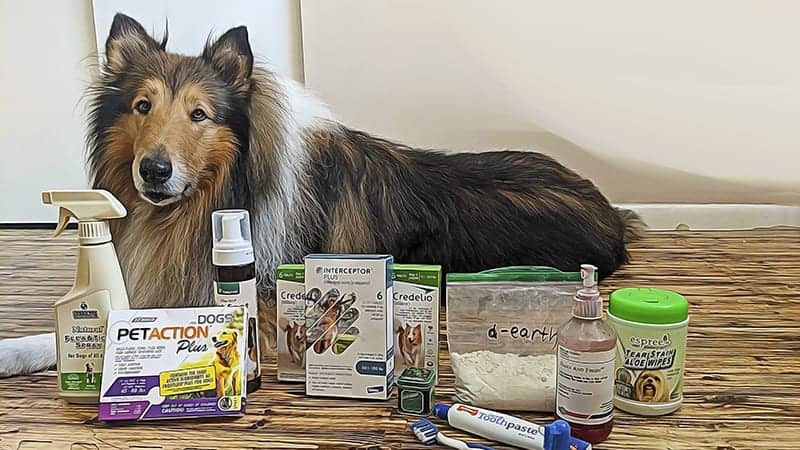

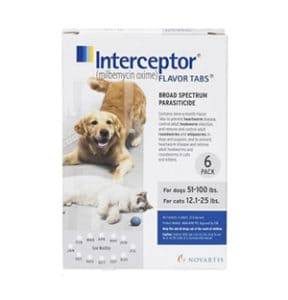
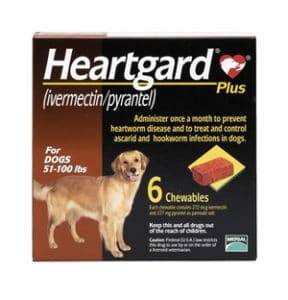

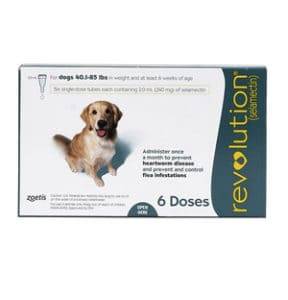
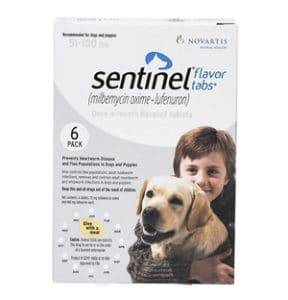
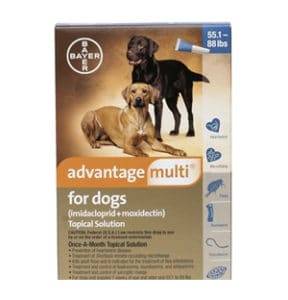
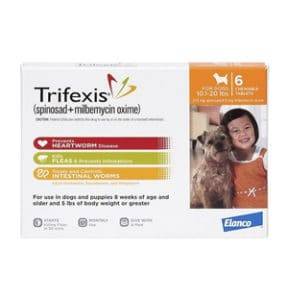
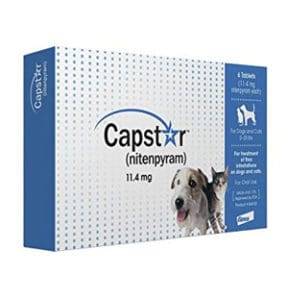
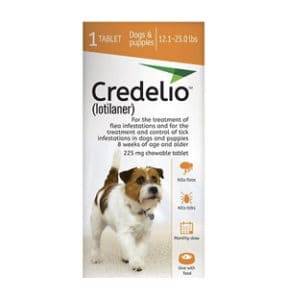
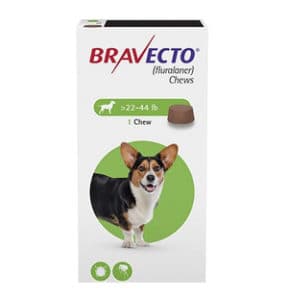
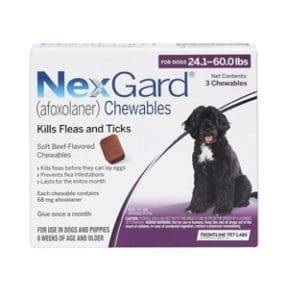
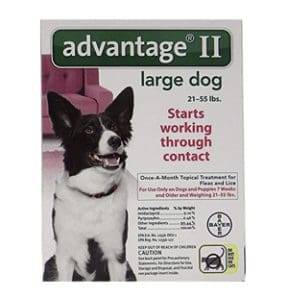
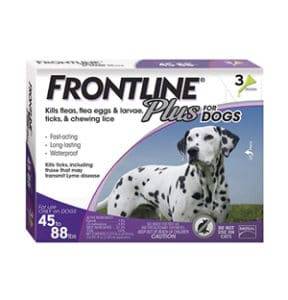
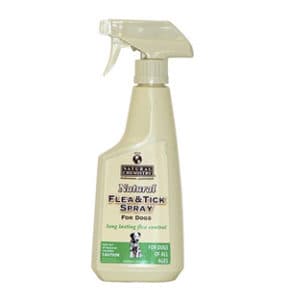
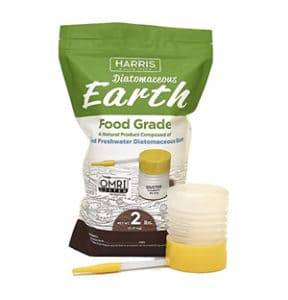
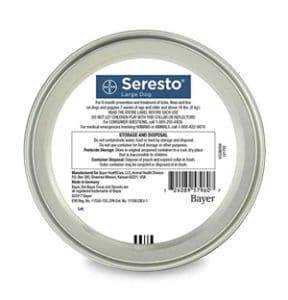
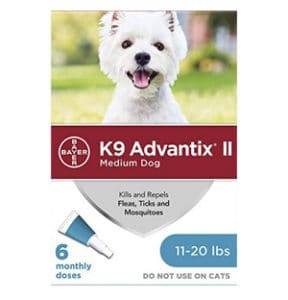
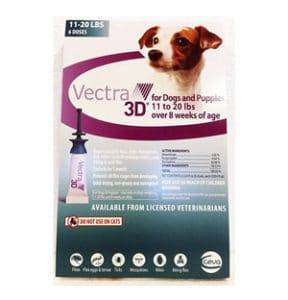



Is Zodiac fleatrol safe? For Aussie?
Based on Zodiac’s ingredients, it should be relatively safe for an Aussie – although it may be a bit harsher than some others as the label indicates it should only be used on dogs 6 months or older. (Also, bear in mind that the Permethrin in Zodiac Spot On will make it very dangerous, even toxic, to cats, in case you have any.) In summary, use with caution.
What is deemed safe to use on a what 12 year old female Border Collie who MAY have Demodex mWite
Either Sentinel or Interceptor are generally considered safe for Collies and can be used to treat demodectic mange. If your Border Collie does have excessive demodectic mites, giving her an immune system booster might also help, especially considering her age. However, it would be best to have a veterinarian collect a skin scraping to examine under a microscope and determine whether skin irritation is caused by demodectic or sarcoptic mites, as the causes and treatments differ between the two types. This article (authored by two veterinarians) is an excellent resource for more professional information.
Thank you so much for all your hard work and care given to writing this very informative and extremely important study… greatly appreciate it 🌺
I’m so glad you found it useful!
I would like to thank you for your very thorough but get to the point info of all these parasitic treatments We have a rough Collie I could not find any info on safe treatments without wading through a river of muck. Your sense of humor is enlightening also. We had a collie before this one and she had seizures from a treatment Thanks again Priscilla
Is hartz ultraguard ear mite treatment for dogs safe?
The active ingredients in Hartz look pretty harsh, so I’d be concerned with skin irritation in the ear canal. I’ve had success using Burt’s Bees ear rinse on my dogs. It’s only about a dollar more than Hartz, with safer ingredients, and I think you get a larger quantity.
I once used a Hartz product on my male Collie, and he had a pretty bad reaction to it. Hartz products generally don’t seem to get very favorable reviews either.
However, I’ve had the best results with a medicated ear mite treatment prescribed by my veterinarian.
Excellent research and well written article! Thank you!
Thank you! I know you’re very particular about the genetic health of your Collies, and I admire your breeding program.
Hi Emily : )
First, I want to thank you for the time and effort that went into writing this article. I’m sincerely grateful!! It was both well written, and concise. I have two Miniature Australian Shepherds that are my entire world: Nola Riley and Otis Kai : ) Nola is MDR1-Heterozygous. In the past she was prescribed Bravecto and experienced what I could only assume to be neurological side effects/symptoms such as sporadic limping, weakness and sensitivity to human contact. I was unaware of MDR1 Mutation drug reactions at the time. Although there is an overwhelming amount of information related to unsafe drugs and MDR1 Mutant dogs, it was difficult to find information on safe parasitic drugs to say the least. Your article was appreciated and helpful!
Second, I’d like to ask a question if you don’t mind. Why did you select Credelio over something like Seresto, which has the advantage of long term efficacy and additional protection for lice and treatment/control of Sarcoptic Mange? If you are able to keep your dogs separated from your cats for 24hrs, the added protection against mosquitoes that K9 Advantix II provides from the possible diseases they carry seems like a greater pro to con ratio. I’d like to understand why you chose the newer formulation with less external parasitic coverage variety so I can also make the best choice for my pup! Thank you again for all your help : )
Thank you, and hello to Nola and Otis! I’m glad you found this information helpful.
Unfortunately, both my Collies and to a lesser extent my Aussie mix have some skin sensitivities: so K9 Advantix II and Seresto, while very effective, would most likely cause them skin irritation. (I have to give them baths with a very mild or medicated shampoo.) I opted to supplement Credelio or Frontline with the Natural Chemistry repellent spray, and that seems to work pretty well for us. Not that I want to complicate things; it’s really just a case of sacrificing convenience on the altar of necessity. 😉
Thanks for the reply! The article mentioned Seresto covered 4 kinds of ticks, so I’m glad you clarified your selection for me. We actually live in New Hampshire and hike (off-leash) quite frequently. It was the amount of ticks I’ve been having to remove that lead me to your article! So tick protection is also a must for us. Given your knowledge, would you suggest Credelio vs. K9 Advantix II (if tolerated) ? Thanks again for your time : )
Thank you for pointing that out! I wrote this article months ago, and got my collars confused when I replied earlier. I went back and edited my comment for consistency. 🙂
Honestly, I think K9 Advantix would beat Credelio as far as effectiveness, due to its repellent properties and ability to kill on contact. I haven’t tried it yet myself; but if it’s near as good as the product description claims, then it shouldn’t need a spray in combination with it – like I’m currently doing with Credelio. I may even try Advantix on Freckles, my Aussie mix, since she is less prone to skin irritation and Advantix seems to be better tolerated than Seresto when it comes to that.
Thank you for writing this article. We have two collies, Dash (8 yr old male) and Roxie (2.5 yr old female). Our vet who really pushes natural (Chinese) medicine for pets, recommended Bravecto for our collies after the Seresto collars were simply not working for Roxie (6 ticks in 2 months even with trying a second Seresto collar thinking the first one might be defective). The Seresto collar seemed to work reasonably well for Dash, but even so we occasionally would find a tick on him. Since switching to Bravecto about 1.5 yr ago, zero ticks on either dog! They both have tolerated Bravecto very well….no noticeable side effects. Dash is MDR1 mutant/normal. Roxie has never been tested, but she is Dash’s niece so probably also mutant/normal if I were to guess.
Hello, Dash and Roxie!
According to Dr. Jean Dodds of Hemopet, “…researchers and veterinarians thus far cannot point to breed characteristics, age group, drug interactions or genetic mutations as contributing factors to the latest findings that prompted the FDA warning.” In other words, the reported adverse reactions to Bravecto had nothing to do with whether or not a dog had MDR1.
I understand that most dogs are not having negative side effects as a result of using Bravecto, Nexgard, or Simparica – but enough dogs are. My personal veterinarian is now only marketing the Credelio, Interceptor, and Trifexis oral parasite medications. Until progress is achieved in ongoing studies, adjustments are made to the medications themselves, and the FDA warning is lifted, I’ll have to leave Bravecto in the “caution” category. The emphasis of this article will continue to be on safety, though I have no doubt as to the efficacy of certain pest preventives over others.
Another safe heartworm medication is the daily dimmitrol. It probably is the safest as it is aimed only at preventing heartworm.
I had never heard of Dimmitrol before, but I did some research after reading your comment. Based on my findings, I’m not convinced of its superior safety. I would actually place it in the “caution” category, since if a dog who had an active heartworm infection was given diethylcarbamazine (Dimmitrol’s main ingredient) it could suffer severe side effects and even die.
Due to this fact, Pet Place warns:
“A negative heartworm test is crucial prior to beginning administration of diethylcarbamazine. The drug must be given daily and if more than two days are missed the risk of heartworm infection is significant.”
Personally, I would be concerned about missing a daily dose. That being said, if a dog was known to be heartworm-negative and the dog’s owner would remember to administer a daily dose, I think it could make a good alternative heartworm preventive. Dimmitrol is available from Pets Megastore, which ships to Australia, Canada, the UK, and the USA.
Turns out “it is also used for the treatment and prevention of roundworms… and lungworm nemotodes in dogs,” according to Vet Shop Max. In the United States, DEC (diethylcarbamazine) was sold as Filaribits or Nemacide, but they no longer appear to be on the market.
Thank you for all the research, it was all so helpful. I gave a mini aussie and a minnie aussie/border collie mix. Where can I get them tested for MDR1 resistance. The Vet is too expensive! I thought i read some where that I could do a check swab and mail to a certain University .
I went through Paw Print Genetics to save money. (There are other places, but none more affordable that I’ve found.) Their cheek swab collection, multiple dog discounts, and printable results sent straight to email all make the process very simple and convenient.
Hi Emily,
I cannot express how happy I was to come across this article, so thank you for writing it! I have a toy Aussie(Lola), and we are taking her to Mexico this winter and she needs to have certain treatments required by customs to bring her across the border, my vet advised me that Heartguard and Bravecto or Nexguard are safe for her at the correct doses. After doing further research I am very reluctant to give her any of these medications, however, I wasn’t finding clear answers on what a safe alternative was until I found your article. We are waiting for the results from her test for the MDR1 gene. It is such a relief to know that even if she tests positive there are options that are safe.
Happy to help! And safe travels to you and Lola in the future.
Hi Emily,
Our family is bringing a smooth collie home soon, so your well-written article was a great find!
One observation: You mention that Credelio has fewer reported seizures (6 in as many months) than other drugs in the isoxazaline class. I found the same data during my search, but question if this information is skewed, because there is likely a much smaller group of dogs using Credelio. Most veterinarians in my area are still prescribing Bravecto, simply because they aren’t yet comfortable enough with Credelio. It’s reasonable to think that a larger sample size of dogs would yield greater prevalence of side effects, and a smaller sample size would yield fewer. What are your thoughts on that? Does your veterinarian give other reasons for prescribing Credelio vs. similar brands?
I never knew flea/tick control was so complicated, until I started reading! Thanks for your efforts to help!
Your comment made me realize I might need to add another paragraph or two about Credelio…
Credelio was actually recommended to me by both of my dogs’ veterinarians. Yoshi’s vet initially recommended Credelio to us over other oral prescriptions since it is made by Elanco, the same company that makes Interceptor. He said Elanco is very conscientious about safety (particularly since Interceptor is used by so many people who have MDR1-prone dogs), and even with his advice I still stood there reading the label and agonizing over my decision before I decided to give it a try! (I didn’t find the information about the 6 reported seizures until after I had already given it to my dogs and seen no ill effects from it.) For Gus’s veterinarian, Credelio is now the only member of the isoxazoline class that he will sell. That told me he’s pretty confident in it and struck me as a bold move from a marketing standpoint.
That’s a good point about the potentially smaller user sample size for Credelio, since it’s a newer medication that hasn’t been out as long as the others. I’ve already modified this article a few times since I originally published it, and I’m definitely keeping my eye on Credelio to see what else will come out about clinical trials or reported side effects.
For me, every medicine has its side effects, and it really comes down to weighing the risk of side effects against the risks posed by parasites. I can’t claim to have all the answers, and my goal with this article was simply to make a fairly comprehensive guide to help each pet owner make an informed decision in tandem with their veterinarian.
Congratulations and good luck with your new dog! I’d like to have a Smooth Collie in the future. We sometimes see a Smooth Collie named Frank at our local dog park, and I’ve been pretty impressed with him. I like Frank so much that I had to give him his own story.
Hi! I have an Aussie mix and desperately needed some info on this. I appreciate the research in this thank you!
Happy to help! ?
thanks for your research. I have a unique situation. I have a female 3 year old collie. After her first heat she went into a false pregnancy. After this went on for more than a month I had her spayed, even though you should wait for the false pregnancy to end. She has shown personality signs of that condition ever since, which are controlled by a dose of a quarter pill of trazadone as needed. I can live with that. Fleas were treated with effifax, active ingredient fipronil. On the second dose she went into an extreme “false heat.” This was shown by panting , pacing, and curling her tail to show being receptive for breeding. Remember she is fixed. The tail curling and pacing lasted over a week. She was obviously in discomfort. I found a paper on the web written with credits to several vets. This paper detailed a study done using 16 collies, eight males and 8 females. THREE OF THE 8 FEMALES WENT INTO ESTRUS. The author states this had no connection to the drug study. I disagree. Any thoughts?
Hi Julie,
Could you send the link to that article you found? From what you’ve told me, that does sound highly suspect. I’m not a veterinarian and would of course recommend that you consult with yours, but I do think that dogs vary individually (just like people) and can react differently to certain medications. If you’re concerned about a possible hormonal imbalance being triggered by Effifax, it might be worth looking into an alternate flea control product that does not contain Fipronil. Another thing to research and to ask your personal vet about might be potential drug/drug interactions between the Trazadone and Effifax, or whichever parasite preventives you choose to use in the future.
Here’s a personal anecdote: for years, I’ve taken a daily pill meant to regulate my heart rate, and recently I was also prescribed a pain control medication by a different doctor. While my pain levels went down, I noticed that my heart rate went up! I looked up potential side effects for the new pill, and sure enough, the product info for the pain medication specifically advised that it should not be taken with blood pressure medication. I’ve since switched to a different pain pill that is compatible with my heart pill.
Kudos to you for going out of your way to manage your Collie’s health, and good luck as you continue to search for what will work best for her!
Regards,
Emily Sowulewski
Thanks for reply. I will try to find the article again, I stupidly didn’t bookmark it.
Thank you for this. We have an MDR1 heterozygous Aussie and this was the best breakdown of the meds we found. Much appreciated!
Thank you for the positive feedback. Happy to help! ?
Is Advantage safe for Collies?
Are you referring to Advantage Multi, Advantage II, or a different product I didn’t cover in the article? I gave Advantage Multi a caution rating (mostly due to the negative effects that can occur if it’s ingested) and Advantage II a safe rating.
Thank you for this thorough and thoughtful work, Emily! We had a wonderful smooth girl for years and while many of the medication names here sound familiar, I can’t remember what we gave her. I do remember her cowering and rubbing her back against her crate after we administered anything topical! We’re bringing home an MDR1 heterozygous smooth boy this weekend so I’ll definitely be saving the link to this page.
Happy to help! Congratulations on your new puppy. I’m hoping to get a Smoothie myself in the future. ?
What an awesome article. I been debating which one to use on my BC and small BC mix for ticks as well as prevention of Mites, which seem to increase in numbers with the ever increasing number of Coyotes we see these days. I had started my GSD on Revolution, but really always liked Frontline better and since that seems to cover more ticks and still protect us from unwanted mites I probably will lean toward that. I hate to use anything, but also tired of keeping my dogs in a bubble. Thank you for the research and the detailed info on each product.
WHAT IS GSD ?????
GSD is an abbreviation for “German Shepherd Dog” 🙂
Thankyou so much for your article…so much great info…I have a 7 month mini Aussie…on Sympartica…but not feeling good about it…she hasn’t been tested for MRD1 but I know I have to change it up…thankyou again 💖🐕💖
You’re very welcome, and good luck with your pup! They’re so fun and exciting (and sometimes exhausting) at that age ☺️
German shepherd dog
What about the use of Simperica Trio for a Collie
I hope you get this.
I am currently fostering 3 rescued puppy mill border collie females with sarcoptic mange. Their treatment for this was nexgard and medicated baths. I got an email from the rescue agency that fussed that I hadn’t given them their heartgard for this month. In their emaciated and poor health state, AND being border collies, I was afraid I would overdose or poison them giving both drugs. Please tell me if I am wrong.
I would say you are right to be concerned, and I’ll give some info why…
Do you know what the ingredients are in the medicated shampoo? Specifically, does it contain any form of -mectin (i.e. ivermectin, selamectin)? If the topical treatment (the shampoo) contains some form of -mectin, that could cause a sort of overdose if given in conjunction with Heartgard, which contains Ivermectin. Any of the -mectins are only safe for MDR1-prone breeds “at the recommended dosage.” A combination of -mectin in topical and oral form could definitely cause negative reactions if any of your foster puppies have MDR1.
You might want to look at the information on Nexgard. (No judgment if you didn’t see that section: I know it’s a very long article and I expect most people are looking for a quick or specific answer and don’t actually read the whole thing ?.) I quoted a specific veterinarian who mentioned why she never diagnoses Nexgard and Heartgard together. (There’s also a hyperlink to her article.) My personal veterinarian is MDR1-aware and only prescribes Interceptor (probably the safest heartworm med) and Credelio (an oral flea/tick medication alternative to Nexgard). I myself have successfully used both on my 2 Collies and my Aussie mix with no ill effects.
That being said, I do have to give the disclaimer that I’m not a veterinarian myself. I just quote the ones who are knowledgeable about MDR1. ?
Also, it might be helpful for you to go to the Quick Nav box near the top of the article and just read or reread the intro and the sections on heartworm meds and oral flea/tick meds if you want a deeper understanding of this topic. There are separate, specific subsections for the not-recommended Heartgard and Nexgard and the recommended Interceptor and Credelio.
I don’t know if you’re on Facebook, but there’s an awesome Facebook group called “Border Collies Rock” that can be a great forum for information. I interviewed a few people (rescue workers, owners, and breeders) from that group for this article I wrote about Border Collies. They were extremely helpful people.
Thank you for fostering! We need more people like you. Good luck with the puppies, and I hope they get healthy soon.
I liked your post very informative I have a border collie that I think has the mdr1 gene we are going to have her tested it seems whatever we give her she has a side effect I would like to know if you have any information for pain drugs or natural medicine she has some arthritis and has sprained her leg
The graphic right at the top of this page might be helpful for you; it lists the drugs that are potentially dangerous for MDR1 dogs. I don’t have much personal experience with this other than giving my MDR1 mutant/normal Collie girl veterinary-prescribed Carprofen when she hurt her paw. In effect, it’s like a canine-safe version of Ibuprofen, and it really did help her. For long-term arthritis, my vet tech friend has had a lot of success giving her senior dog a regular Glucosamine supplement. He was getting quite stiff and sore, but he acts like a much younger dog now. That’s what I plan to use in future, when my oldest dog reaches that point. But of course, do talk to your vet and see what they know. ? Best of luck with your girl!
Hi Emily,
Your such a good writer,thank you so much for posting this very informative article.In this way it will greatly help keep our pets safe.
Hello,
Thanks for your informative article. We have a almost 10 year old tricolor rough collie, named Hollie. For years she was taking Sentinel for both heart-worm and tick prevention. She has always had a sensitive stomach, but as she gets older, it gets worse. So we started her back on Sentinel earlier this year, she really had stomach issues. So the following month we tried Interceptor Plus and it was fine. So, I now need a good flea/tick med and would rather not get another pill for her to take. So called vet and they said topically we should try Parastar Plus. They said Frontline Plus doesn’t really work anymore like it used too. So, what do you think of Parastar Plus?
Hi Debbie! Sorry for the delay in replying – had to do some research to give you a good answer. Parastar Plus is not something I’ve personally used, but it should be safe as one of its active ingredients is Fipronil (which is in Frontline) and the other active ingredient, Cyphenothrin, is in the same family of drugs as Permethrin.
Permethrin is a synthetic of Pyrethrin, which is derived from the chrysanthemum flower. Also, Permethrin is one of the active ingredients in K9 Advantix II, an effective spot-on product I’ve used on my Aussie mix with no ill effects. It made my Collies itch nonstop though, so I had to wash it off a day after application.
I found some good information on the Cyphenothrin in Parastar Plus in this article.
It points out that flea resistance to Cyphenothrin is also widespread, and Cyphenothrin’s efficacy can be reduced when broken down by sunlight. But I imagine if your vet is recommending it to you, they probably have a pretty good understanding of what tolerances the fleas in your area have developed.
In summary, it looks like Parastar Plus is comparatively a gentler product than some topicals since the concentrations of its active ingredients are fairly low, but the trade-off may be that it lacks the strength of products like K9 Advantix II. In hot, flea-infested areas like where I live in Florida, Parastar Plus might not be the best option; but it’s definitely something I would have tried when I still lived in Michigan.
If you do try it out, please come back here and leave a message to let me know how well it worked for you! Give Hollie Collie a good butt scratch or ear rub from me. 🙂
Hi, Thank you for this helpful article. We have an 11 year old tricolor rough coat collie. Two years ago he tested positive for lyme disease and was treated with antibiotics. (Which made him feel really sick.) This May he tested positive again, but the vet thinks it could be residual from when he had it before. Anyway, we have a lot of lyme disease here in Wisconsin so we need a good tick preventative. I will not give anything oral to my dog, since our first collie was probably killed by heartworm preventative. We have always used Frontline Plus, but it has recently started causing dandruff on our dog, and it makes his coat “greasy.” I asked the vet for an alternative and was recommended Seresto collar or Vectra 3D. Based on your recommendations, I will not use Vectra. When reading about Seresto, their website said it doesn’t work well on dogs with heavy coats, ie. collies. What do you know about this? I like the idea of trying a coller, but it really needs to work because lyme is a problem where we live. Thanks!
Hi Kathy,
I can’t speak from personal experience on this, but the Seresto effectiveness/safety question has come up in an international Rough Collies group I’m part of on Facebook. Many Rough Collie owners swear by them, and one owner mentioned that she lives in the woods and the Seresto collars kept the ticks off her Roughs. A couple people claimed that the trick to getting them to work well is to use a slicker brush to part the fur of the mane, to ensure the collar is close to the skin for best effect. One person commented that their Collie had irritation at the point of contact, so they recommended checking frequently to make sure the collar is not irritating the skin. (Of course, skin irritation can happen with any topical product.) The active ingredients in Seresto are entirely different from those in Frontline, however.
Last time I took my Collies to a pet store here in parasite-infested Florida, I asked one of the clerks what they sold the most of as far as flea and tick preventives. Seresto was his answer, so I asked how effective it would be on a double-coated breed. He said he himself uses Seresto collars on his Australian Shepherds, but that in his experience the collars tend to last 6 months for his fluffballs, not 8.
For my Aussie mix, I’ve had success using Advantix II. It’s a nice alternative to Vectra 3D since it’s not as potent (so less chance for irritation), yet it also has some repellent properties. It has the same active ingredients as Seresto (plus one), so a bit stronger. However, it did make my Collies too itchy. I went back to using Frontline Plus for them. At least once a week or before we go walking down woodland trails, I also take the precaution to spray my dogs’ legs and lower body (and my shoes) with Nature’s Best or Natural Chemistry flea and tick repellent. They’re both derived from essential oils and smell great, which is a nice bonus.
Best of luck with your boy!
I tried Seresto with my girl and she had a seizure. Took that collar right off her.
Oh no! ? Have you reported the seizure to Bayer (the company that makes Seresto collars) and to the EPA? (The Environmental Protection Agency is responsible for approving external flea and tick products.) I did some digging, and from what I’ve read it sounds like just one report would be considered “anecdotal” and would not be considered evidence that Seresto could cause seizures, but if there are 2 or more reports then the company might be obliged by the EPA to add a potential seizure warning to its label or possibly to do more clinical safety research. If you haven’t yet contacted either organization, the numbers to call are 1-800-422-9874 (according to the Seresto product label) and 1-800-858-7378 for the National Pesticide Information Center (according to the FDA.gov website). Be prepared to answer questions about whether your dog had a previous history with seizures, has any drug sensitivities, if anything else could possibly have triggered a seizure, and if she has had any seizures since the collar was removed.
My Collie is double MDR1 mutant. I just took her off Sentinel Flavor Tabs. She had a severe reaction with diarrhea, drooling, depression etc. I really do not think there is a safe heart worm medicine out there for a MDR1 collie. I am going to try WonderCide as recommended by my Vet for fleas. It is supposed to repel mosquitoes as well but I am very nervous about not using a heart worm preventative. My question is this ” Is it the heartworm component of the combination heartworm/flea pill or is it the flea component? Or is it when given together?” I really do not know what to do and get no real input from my Vet.
Hi Meredith,
I realized that I just replied to another comment from you… I’m sorry you and your doubly sensitive girl are having such trouble trying to find products that work for her! Wondercide sounds like an excellent place to start as far as flea and tick prevention, and I hope it will be effective against mosquitoes, too. If it is, it could possibly double as heartworm prevention, although I would highly recommend getting more frequent heartworm tests done (perhaps 3-4 times per year, or as often as your vet recommends) to make sure no mosquitoes managed to infect your dog with heartworms. The Wondercide website says, “We recommend testing any new product you introduce to your pet or environment eight hours prior to a full application to ensure there are no sensitivities.” With cedar oil being the main ingredient, it should be relatively safe; but it’s best to be cautious, especially as your girl has proven to be so sensitive. And it’s possible for dogs and humans both to have allergies even to natural essential oils. Please let me know how the Wondercide works for you! It sounds similar to a couple other natural oil products I’ve tried.
If you haven’t yet tried Interceptor for heartworm prevention, I would suggest that for you. Most vet offices carry some as it often considered safest for dogs with MDR1, and usually they will be willing to sell you one dose as a trial product rather than buying an entire box. Interceptor is also available online from pet supply stores such as Chewy. My personal vet is knowledgeable of the MDR1 gene mutation (now also referred to as the ABCB1 mutation), and he recommended Interceptor to me for my mutant/normal Collies. Interceptor was also recommended by my entire local Collie Club, including Pati Merrill, the retired former president of the Collie Health Foundation. Although it would be very hard to determine exactly which component of a combination medication your Collie is reacting to, your girl might be less likely to have a reaction to Interceptor (regular, not Plus), as it only has one active ingredient as opposed to the two active ingredients in Sentinel. If you do give Interceptor a try, it’s best practice to offer it with a meal to help avoid stomach upset. Of course, I do have to state the disclaimer that there’s no guarantee with any product that it won’t cause a reaction, but it sounds like you’re doing a good job of monitoring your girl after giving her anything. Please keep me updated if you think of it! Best of luck with your girl.
Emily Sowulewski
What’s the best safest flea tick treatment for a collie puppy? Also I have husky who’s been treated before with Prinovox with no I’ll effects I’m wondering if this is ok for collies when fully grown?
As far as which flea and tick protection would be safest for a puppy, some of my top picks are Capstar (for instant relief, not necessarily long-term use), a natural oil spray like Natural Chemistry or Wondericide, or something not very harsh like Frontline Plus. (I’m guessing based on your question about Prinovox that you’re not in the US, so in case Frontline goes by a different name where you are just look for the active ingredients Fipronil and S-methoprene.)
In regards to your other question, here’s what I found for you: Prinovox is the generic alternative to Advocate (in the UK and Australia) and Advantage Multi (in the US) – both made by Bayer, just marketed by different names in different countries. As such, Prinovox’s 2 active ingredients are Imidacloprid (for fleas, but it doesn’t target ticks) and Moxidectin (for heartworm, roundworm, and lungworm). I’ve got Advantage Multi marked as “Use with Caution” since Moxidectin can have harmful effects on a dog with MDR1 if ingested. According to the Vet UK website,
“This product contains moxidectin (a macrocyclic lactone), therefore special care should be taken with Collies, Old English Sheepdogs and related breeds or crossbreeds, to correctly administer the product as described under dosage schedule…”
However, it’s technically safe so long as it isn’t applied past the shoulder blades where your Collie could reach it. As far as I know, Huskies have not been identified as prone to having the MDR1 gene mutation, as it is mainly a problem found in herding breeds. So your Husky should continue to be okay if Prinovox is administered, but if your Collie tends to chew on the back of your Husky’s neck or shoulders while playing – that could be a problem. If your Collie doesn’t play like that, you should be fine.
I have to state the disclaimer that I’m not a vet – just someone who took a Research and Publishing class in college. 🙂 If you can, it’s always a good idea to consult with a vet who is knowledgeable about MDR1 and Collies.
Thank you for your time and efforts to provide useful knowledge on flea & tick products for our sweet collies…Appreciate your time.
Happy to help! And thank you for saying so. Positive feedback keeps me writing! 🙂
I use Advecta 3 because it prevents and kills I have been in the dog Bussiness for over 26 years and used to use frontline bit past few years switched because frontline doesn’t prevent ….I never had a problem with advecta 3 and hope its safe
As this is a Collie blog and I assume the majority of people who read this post have a Collie, I’m just hesitant to recommend it since many Collies have issues with sensitive skin – even if they’re clear of MDR1. My 2 Collies both had negative skin reactions to Advecta 3D, unfortunately. For the majority of dogs, Advecta is probably fine! My Aussie/Pyrenees mix has had no issues with it, for instance. Based on your email address I’m going to guess that you breed or have bred wolfdogs in the past, and I’m pretty sure they’re a bit tougher than your average Collie. 😉
Hello, You mentioned ADVANTIX should be use with caution because of cats being around collies, but what about if I only have collies? is it safe or not to use it?
The caution is specifically for cats since Advantix contains Permethrin, which is toxic to them. From the standpoint of MDR1 dogs, it is safe. However, it is strong and can cause a skin reaction. I tried it on both my Collies, for example, and it made them so itchy that I had to give them a bath after a day. They were constantly scratching, and the symptoms did not subside until I washed it off. I personally prefer something gentler as many Collies can have sensitive skin, but it really depends on the dog.
Thank you for such a great article! I just picked out a beautiful tri color rough collie this morning! We will get her in about 3 weeks. I am so excited. We often go on walks in the woods. Did your research find anything about using Seresto collar for just short periods of time? My thought was to put on a collar in the morning and take it off at night when she will safely be back in the house. And use same collar for a few months.
Hi Vicki,
I thought I initially replied to your comment back in December, but I was just reviewing the comments section and it looks like my reply never posted! Just checking in to see how you and your pup are doing and if you ended up using Seresto collars or not. I actually just updated the section on Seresto collars today with new info and a link to a USA Today article about side effects resulting in seizures and even death. Now that this information has come out, I can no longer officially recommend Seresto collars since many Collies have sensitivity issues – even if they don’t have MDR1. However, I think your plan to take the collar on and off was probably the best way to give it a safe trial period.
Thanks Emily!
Sugar is almost 4 months old now! We love her. I did not need to try the Seresto collar. It was winter. We took her to a vet who is very experienced with collies (she helps with a rescue) and has assured me that Simpirica Trio is safe. We gave her the first dose in late February and there were no adverse side effects for Sugar. I say this as she is running around the room l barking and trying to dig up the coach…yep, just about nap time…
That is excellent news, and I’m so glad to hear it! Sugar is a great name for a Collie as they really are such sweethearts. 🙂 They’re so fun and crazy at that age. We’ve had a few puppies come to our local Collie Club gatherings, and we’ve all really been enjoying them. Best of luck to you and Sugar! ❤️
Hi there , thank you for putting this information up! I have 7 collies and I am reluctant to put them on anything that’s not natural , we did get a kitten and found a flea so looking for something to treat all as a precautionary for a month as we are in winter season in Northern Ontario Canada.
Thanks much for the info before I bought anything! Appreciated!!!
Happy to be of help! Seven Collies sound like a lot of work but also very wonderful! Are you also on Instagram, by chance? Congratulations on the new kitten. 🙂
Emily, thanks for a very helpful and informative article. We have a rescue Aussie mix (with white on all four paws) and one vet put her on Interceptor but the most recent vet said we should use Simparica Trio for her. I’m trying to find out if this is safe for her. Your thoughts? Thanks
Hi Lin!
Bear in mind that my opinion is by no means professional, but personally I’d go with your first vet’s prescription. (Most vets are going to recommend to you the products they carry in stock, but you can order online from Chewy or pet pharmacies.) From an MDR1 standpoint, Simparica is *technically* safe; but I am leery of it considering the FDA warning about isoxazolines (“-laner” medications) I discussed in the article. There weren’t as many seizures reported as with Nexgard, but it did have several more reported than Bravecto.
I know Simparica is more convenient since it means giving one monthly preventive instead of two, but the trade-off with the combo meds is that they’re usually stronger. I had success giving Credelio (active ingredient lotilaner instead of Simparica’s sarolaner), but in all honesty I administered that based on my vet’s recommendation BEFORE I realized the FDA warning also applied to Credelio. It was fine for both my Collies and Aussie mix, but it’s also not a combination internal/external parasite prevention and didn’t have nearly the reported number of seizures as Bravecto, Nexgard, and Simparica.
Bottom line is that Simparica will probably be fine for your dog, but there is a slight risk that it won’t. It just depends on the individual dog. No one knows yet why some dogs react to isoxazolines like Simparica and others don’t, and there’s no way to know until it’s tested on an animal. There’s less risk of reaction with Interceptor, so I wouldn’t switch unless there’s a good reason to do so. Hope this helps!
Best,
Emily
I’d like to thank you so very much for this in depth article. I found it extremely helpful & educational. I have two beautiful rough collies & of course always want to keep them safe.
I’m happy to hear it and so glad it helped! Our dogs deserve the best. 🙂
Hi Emily, this is a great article and I appreciate all of your research! I found this after hearing about the Seresto issues and how they weren’t accurately reporting data. I was using Seresto collars and am on the hunt for something else. I’m leaning toward Frontline Plus based on what you wrote. Will you be updating this article with regard to Seresto? Is Frontline Plus still safe? Thank you!
Thank you for the reminder! I recently saw the USA Today headline (I get notifications on my phone) about Seresto collars and made a mental note to read it later and update this article if need be – then promptly forgot about it! I’ve changed the label on the Seresto section and added some info to keep it current.
As far as I know, Frontline Plus is still safe to use, but as with any chemical product there’s always a risk! All I can tell you is that I’ve personally used it for years with no adverse reactions, everyone in my local AKC Collie club has also used it without trouble, and I’m not aware of negative reports that have reached the news. Frontline Plus is milder than Frontline Gold, which I wouldn’t recommend for the same reason that I don’t like recommending Advantix – they’re too strong and have a tendency to cause skin reactions. The more common complaint with Frontline Plus is that it’s not strong ENOUGH for a lot of people, since it lacks repellent properties. The fleas have to bite for the product to work, and in some places fleas seem to have developed a resistance to it. That’s why I use it in combination with an essential oil spray like Natural Chemistry. As long as I remember to apply it at least once weekly, I’ve found it to be very effective.
Wonderful! Thank you SO much!
Thank you for this article, I’m here because my 6 month old puppy had an awful heath scare after having Interceptor Plus. I was bummed to read its the safest since I don’t want him to have it every again (a little off balance shortly after and salivating) but later he had an episode with fixed eyes, stuck in a strange position, stiff muscles, blind, he had a heart rate half of what it should have been and a head tremor. It was very frightening. Thankfully he recovered but my vet tells me Interceptor Plus is safe and he must have ingested something on his walk. I doubt it as he was on leash and I’m always watching him. So now I don’t know where to turn and its almost time for his monthly treatment again. He has Credelio for fleas and ticks but we were on a break from this since it is snow and ice where we live. I just don’t know what to do about heartworm treatment and wonder if Interceptor instead of Interceptor Plus would be a better option or more of the same. The vet is really no help.
Thank you for bringing this to my attention! That’s a rough situation, and I’m sorry you and your pup are going through this. Normally I would advise to just listen to your vet, but in this case I think I have to say listen to your instincts also – especially since you’re the one living with your pet and making the observations. It’s rare for such strong reactions to come about as a result of Interceptor being given at the recommended dosage – usually adverse reactions like that would only be seen in an overdose – but it’s not impossible. Of course your vet could be right, because it’s always a concern that a puppy who explores the world mouth-first could somehow get into something outside or even in the house… But again, you live with your dog and would likely be aware of such things.
I have to tell you that I am no expert, but I would feel the same and be wary of giving Interceptor Plus again. Maybe regular Interceptor would be fine since it doesn’t contain Praziquantel, but it’s difficult to say exactly what your dog is reacting to. Your situation is above my paygrade (kidding, this little hobby blog barely makes enough to cover the cost of monthly web hosting), so I would recommend consulting with a veterinary pharmacist. I honestly didn’t know they existed until I started researching more to answer your question.
Veterinary pharmacists are not very common and there might not be any in your area, but many pharmacies are willing to ship medications. (I googled “veterinary pharmacists near me” and found one locally, but Jacksonville is a huge city.) It’s worth making a phone call to see what they would recommend for your pup. In the meantime, no need to give heartworm meds if it’s still snowy where you are, so you’ve got some time to figure out what to do before the mosquitoes become active again!
If you have one of those rare dogs who is just going to react to every heartworm medication (fingers and toes crossed that’s not the case), then you might want to consider frequent heartworm tests as an alternative to regular heartworm treatment. Basically, the idea is that heartworms take a few months to develop anyway, so every few months you get your dog tested – instead of merely annually – and ONLY treat for heartworms if bloodwork reveals that your dog has contracted heartworms. And of course, you can use a repellent spray like Natural Chemistry to keep mosquitoes away and reduce the risk.
Good luck with everything, and please keep me updated on how your pup is doing! You can also reach me through the contact form here on the website.
Thank you for your article. My dog has been tested and is mutant/normal (MDR1). I’m just looking for advice as to tick prevention medication. She is just 1 year old. Last year I used Frontline Plus with no issues. This year she has a very high degree of irritation when applied (I had to wash it off). She has a close cat buddy, so I’m scared to use another spot-on that is poisonous to cats. I was leaning towards, but have not tried, the combination of Interceptor tablets (heartworm) + Credilio (flea and tick) tablets. I used Interceptor last year with no issues. I read that you you used this combination with success. Would this be your recommendation?
If you’re going the oral tablet route, Credelio is one I personally feel comfortable with! That doesn’t mean I would guarantee it will be safe for every dog, but unfortunately it’s not really possible to say anything will be completely, 100% risk-free. One thing about Credelio is that it only breaks the flea life cycle at one point (kills adult fleas only after they bite the dog), so you may want to use a natural flea & tick repellent spray to increase its effectiveness. That’s what I’m doing for my most recent Collie. He’s just a puppy himself and was already started on Interceptor and Credelio.
Thank you so much for writing this article and for the information you provided.
Thanks for reading! I hope it helps 🙂
Great summary! Thank you. I live on a farm that borders a forest, so coyotes/deer etc.. no avoiding ticks. Is the Frontline the one listed in the article ok in a multi dog family where there is a risk of one licking it off the other? That is my concern.
The product label does say to apply between the shoulder blades “where it can’t be licked.” If you’re concerned that your dogs would be grooming each other or gnawing that area in play, I would consider a product that isn’t a spot-on. (My dogs don’t groom each other or really play that way now that they’re older and settled, so I feel comfortable using topicals now.) So it really depends on the individual dogs, and you know your dogs best!
Wow! Thank you so much for writing this article!!! I just had my vet mention the mdr1 gene today in passing. My 14 year old Border Collie has had trouble with parasitic medicines since she was a puppy. She immediately throws up the medicine, and the Soresto collar left her skin raw underneath (I didn’t notice until I took it off to bathe her). The topical medicines seem to work best with her, but don’t do much to keep the tics at bay. I’m going to order some of the organic spray to help. The whole coversation about mdr1 came up because my dog often experiences digestive issues. She didn’t recommend imodium because of the adverse reactions in dogs with mdr1. Your article has been very helpful in my quest to help my forest loving dog stay safe from tics.
I’m happy to hear you found it helpful! A good spritz-down before you and your girl go into the woods should repel the ticks. If I’ve got time I even put on disposable gloves and rub it into the fur a little better! I can’t promise that it will be 100% effective, and one or two ticks may still latch on – but I’ve seen zero ticks on my dogs since I started using the Natural Chemistry spray in conjunction with Frontline Plus. That way if a tick does make it past the essential oil barrier and bite, it’ll die anyway.
I’d like to have a Border Collie one day, but as I have some health issues I’m not sure I could keep up with one. My plan is to adopt a senior Border to go with my lazy Roughs. 🙂 Enjoy your girl! Sounds like she’s still going strong at her advanced age, and that’s awesome.
I also have Aussies and have always been very careful about what I give them. Thank you for your article. My dogs are on Sentinel right now and Frontline Gold. What do you think about Frontline Gold? Just as another concern, I had two cats die from Advantage Multi. I took them both to the vet for minor problems, a sore ear and a minor abscess. The vet thought he would be nice and put Advantage Multi on our cats. Before I got them home, they went into comas. Nothing could be done for them. The vet said at first that was not possible and checked with their pharmaceutical representative who said that was not possible. Later, the vet had the experience of this happening to other cats and one of his own. Apparently, it affects certain cats with a certain gene. My two cats were father and son so probably carried the same gene.
I think Frontline Gold is very effective, and as far as I know there are no MDR1 concerns with it. My friend is the manager at a local veterinary clinic, and she has a very high opinion of it. However, as it is the amped-up version of Frontline Plus and contains 3 active ingredients, it’s always wise to check the application site for adverse skin reactions. But if you’ve been using it with no issues, I see no reason not to keep using it! You probably already know Frontline Gold can be toxic to cats, since it has a caution on the label, but this is only really a concern if you have a cat who cuddles with or grooms your dogs. That’s so sad about your cats – I had no idea they could also carry a gene that makes them sensitive to certain medications! Thank you for the warning. I have a cat myself, so I appreciate the information.
Hello!
I have an 8 year old BC and a 12 week old English Shepherd/Rough Collie mix. I give Interceptor Plus for HW, but I’m conflicted about which direction to go for flea & tick. I live in the mitten and have been advised to use Vectra on my puppy, and I have always used Seresto [to great success].
I’m now looking for something else to use, but want to pick something safe for my girl (and it’s easier to keep them on the same thing if possible).
Any suggestions?
Hi Katie,
Have you had any issues with Seresto? If your dogs aren’t reacting to it, why are you switching? Vectra is a rather strong product that I won’t personally recommend, as so many dogs in the Collie family have sensitivities. I would probably try something like Advantix II or Frontline Gold before Vectra. Those are both still very effective products, but have fewer horrror stories of terrible skin reactions. Personally I use Frontline Plus and supplement weekly with a Natural Chemistry spray as a repellent, but I understand that might not be ideal for everyone depending on their situations.
Thank you for this. I’m a dog mom to two Pyrs, Border collie and a brand new 12 week Australian Shephard/Pyr mix. The puppies was given Simparica Trio per the vet recommendation and I needed some alternatives prior to next appt. She’s been a red hot mess and I’m not convinced Simparica isn’t the cause(stomach issues, hyper activity(I raised a border so ready for energy but this is frenetic) and not sleeping more then 30- 40 minutes at a time. This gave me a great start for research. I think this is a couple years old.
Happy to help! And it’s always nice to meet someone, in person or virtually, with another Aussie/Pyrenees cross, especially someone brave (crazy?) enough to have 4 dogs like I do! Freckles my Aussie/Pyr is such a great dog. 🙂 I did write this article a couple of years ago; but I have updated it several times since – most recently after information came out about some fatal reactions to Seresto collars. Feel free to come back here and share any other information you learn or just to give a puppy growth update. Best of luck with your new girl!
Thank you for your very informative article. Except for the warning about Cats who have close contact with collies, my impression was that you thought K 9 Advantix was safe and effective for Collies. Fleas this summer in my part of CA are particularly bad. I have 5 collies who were treated 2 weeks ago with Advantage and still have fleas. Our cat does not socialize with the Collies. Our are both indoors and outdoors. Of all the products you mentioned, I would prefer to try K 9 Advantix since it both repels and kills. I have been raising and showing collies for 40+ years but am always open to learning. Thank you. Mary
So glad you found this useful! As with any topical, of course keep an eye out for skin irritation. But I do think K9 Advantix is a good choice for Collies who aren’t overly sensitive. Best of luck!
Hi Emily
Please help! I have a 3 year old and an 11 week old Australian Shepherd. My Vet told me Trifexis was safe to give them. Is this true? Should I give them Trifexis or Sentinel Spectrum? Just want to do what is best for them? Please tell me which is the safest!
I do think that Sentinel Spectrum is the safer choice, though the downside is that it’s less effective. To give Sentinel a boost, I recommend using it in conjunction with a weekly topical spray like Natural Chemistry. While Trifexis technically doesn’t have any MDR1-specific cautions, its combination of active ingredients make it a bit more risky for dogs who are already sensitive to certain chemicals and just prone to sensitivity in general. Bear in mind a dog can negatively react to anything though, so it’s always best practice to keep a close eye on them after administering any new product! It also helps to know your dogs’ MDR1 statuses, which can be checked through places like Paw Print Genetics.
Thank You so much for your quick response Emily!! I actually ended up choosing Interceptor Plus along with Credelio after looking at your research and getting some advice from fellow Aussie owners. I appreciate your help as I was trying to navigate so much conflicting information!! 🙂
My border collie/lab mix has a major seizure yesterday and has no history of seizures before this. I gave her Simparica 5 weeks ago for the first time. Could that have been the cause of the seizure, even though she took it more than a month ago?
It seems unlikely for that much time to elapse before a reaction, but I would definitely consult with a veterinarian.
Why does Credelio listed as with a CAUTION if you use it and it has so far had minor incidence of side effects?
Because I am only one person, the medication is relatively new, and it has active ingredients that are the same as more well-known medications that have been known to cause issues for many dogs, I didn’t feel that I could give it an entirely glowing recommendation.
Hi, I was just wondering if you still use credelio for flea prevention? I have a one year old Aussie mix. We use interceptor for heartworms and was using frontline until she recently started having negative reactions to it. Our vet recommended Bravecto because he said it had been specifically tested on dogs with the MDR1 gene. It makes me nervous since I have seen/read plenty of negative things about bravecto and I’m also worried to combine bravecto with interceptor. Is credelio considered safe when using interceptor?
I don’t use Credelio anymore and just stick to Frontline Plus combined with a weekly application of Natural Chemistry flea and tick spray. In my opinion, this spray is great combined with anything since it has repellent properties and smells delightful. (Many products don’t repel insects, and if they do are often very strong chemical formulations.)
I recently adopted a Collie puppy who came with a dose of Credelio and Interceptor, which I have in the past successfully used on my other 3 dogs (both Collies and the Aussie mix). Unfortunately, when we gave Vakaa his dose of Credelio, he threw it up – twice actually since I wasn’t able to get to him before he gobbled up some of his regurtitated food! His food hadn’t changed, so I’m nearly certain it was an adverse reaction to the Credelio. Either way, I certainly don’t want to risk it for him again. That was only 1 out of 4 dogs, but I just feel better in general sticking to topicals. I’ve been accused of being overly cautious when it comes to my dogs, but I admit to being a better safe than sorry kind of person!
THANK YOU, THANK YOU, THANK YOU! This is so thorough and helpful!
My pleasure! I’m glad you found it helpful. 🙂
Do you have any recommedations about Simple Guard3 for Shetland Sheepdogs?
The active ingredients of SimpleGuard 3 are the same as Vectra 3D: dinotefuran, pyriproxifen, and permethrin. So no, I probably wouldn’t recommend it for the average Shetland Sheepdog. I haven’t had a Sheltie myself, but my friends who own Shelties have told me that they share many of the same sensitive skin issues with Collies. Dinotefuran in particular is a strong pesticide, and all 3 of those ingredients combined are harsh on sensitive skin.
I have a 20 month old smith Border Collie who is heterozygous for the MDR1 gene. I have been told that Advocate is safe for him at the recommended dose. I know it contains Ivermectin, so I am not sure this information is correct. I would appreciate your comments on Advocate.
Thanks
Trish
Hi Trish,
According to the Advocate website, the active ingredients are Imidacloprid and Moxidectin. I don’t believe Advocate is marketed here in the US, but in Australia it looks to be Elanco’s version of Advantage Multi, marketed by Bayer. (Same active ingredients in both.) If you click on “combination medications” in the table of contents at the beginning of the article and read the section on Advantage Multi, you’ll find that I’ve given it a caution rating along with reasons for that rating. Advantage Multi can be a great product when used with care, and I would expect the same to be true for Advocate. However, it does claim to kill fleas on contact. That indicates it is a strong chemical compound, so do watch for skin irritation. Hope this helps!
Hi Emily, do you know if panacure is a safe wormer? Also what can be used for giardia? Emma
Hi Emma,
Panacur should be safe even for dogs that carry the MDR1 gene, as it is not on the WSU list of problem drugs and the only documented side effect is diarrhea – and even that is rare. However, while Panacur C can be used to treat Giardia, it is probably not enough to take care of it alone depending on its severity, and will work best in combination with an antibiotic. Giardia can be passed to and cause diarrhea in humans. If you have a dog you suspect has Giardia, it really is best to see a veterinarian.
Is Simparica Trio safe for collies?
Hi Lori,
I’m not sure if you saw it; but I wrote about Simparica under the same section where I dealt with Bravecto and Credelio, since they all are orally administered medications that have ingredients in the “-laner” family. Simparica Trio has the same main ingredient as regular Simparica, plus two added ingredients. Since I recommend being careful about using Simparica, I would be even more careful about using the more potent Simparica Trio.
Thank you very much! Super useful research.
Thank you thank you thank you for this article. My border collie started having seizures (he was on Bravecto AND Sentinel) and the vet never said anything about the gene mutation. I need to pivot, and looking at Frontline there are two new Frontline products to combat the flea resistance. Frontline Gold and Frontline Shield. Any thoughts on either of these? In FL resistance is bad, and we split our time between FL & NJ. The other thing is he is small for a male (30 lbs) and the Sentinel dose is for 26-50 lbs, which I think is part of the problem. Thank you!!
Hi Tracy!
Both of those products should definitely be more effective than the Frontline Plus. Personally, my Roughs have sensitive skin plus I have a household cat, so I’d try Frontline Gold first. Frontline Shield has Permethrin and Pyriproxifen, so my concern would be that those 2 ingredients together would be stronger and potentially cause skin irritation. Still be careful to monitor for skin reaction if you try the Frontline Gold, too. Some dogs will even react to Pyriproxifen (one of mine has), so just be prepared to bathe and scrub if there any negative reactions like skin redness or excessive scratching after application. If you think about it, come back here and let me and other readers know what worked best for you!
Emily ❤️
Thank you for all your research and article!! I didn’t see the link for the drug compatibility. Thanks.
I have a new Collie-mix with bi-coloured coat. I chose Frontline Plus for him as it seems to be an older, safer spot-on. The manufracturer’s website lists many different kinds of ticks, and people on this thread talk about using FrontLine for ticks. Somewhere I read that it’s good for 4 kinds. Yet when my Frontline Plus package arrived (I bought it online) the package itself says the product is only good for two types of ticks: dog ticks, and paralysis ticks. I have never even heard of the latter and do not believe they exist in Canada. We do, however, have lots of deer ticks (also known as black legged ticks). I have called two divisions of the manufacurer trying to find out whether the products cover all the ticks they list on their website, or only the one tick of concern that they list on their packaging. So far, noone has the answer to this seemingly-simple question as to what ticks their product actually acts against.
Thank you for the useful information which is a little easier (clearer) to understand than most. I have a 8 yr old MAS/Aussie who is MDR1 +/+ and I have her on Trifexis and have had no issues to date. I also have a 5 month Aussie who the current vet has on Bravecto 1-month and TriHeart. ( I had to get a different vet for my pup because my current vet couldn’t get him in to start his vacines for 2.5 months. Unacceptable for me) He is MDR1 clear. I plan to switch him over to Trifexis also. My question is about Capstar. Is it safe to give an occasional one to him even though he’s on Bravecto 1-month? Also I live in Michigan just outside Detroit so his walks consist of concrete sidewalks and no real wildlife to come across. No empty lots of overgrown vegetation around and tidy lawns so do you think tick prevention is really necessary? My vet wants to give him a vaccine (?) for, I think it’s brown ticks. My other vet never brought this up when discussing my MAS. Is this vaccine something you’ve heard of?